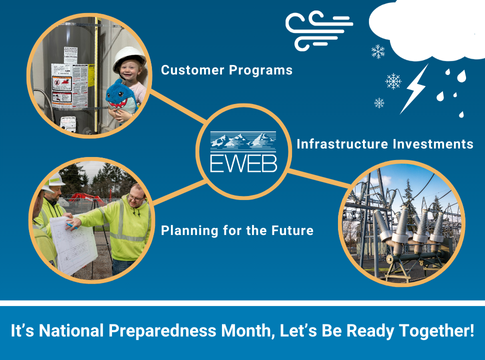Related News
Related News
-
NASA partners with EWEB to assess wildfire impacts to drinking water
NASA's Earth Information Center shares a new video detailing how EWEB's Drinking Water Source Protection work is advising new research tools
Find Out More -
EWEB prepares for wildfire season with risk mitigation measures
EWEB is building a more resilient electric system to weather various types of disasters, from wildfire to winter storms.
Find Out More -
Sustainability Snapshot - Homes for Good May 2025
Our first Sustainability Snapshop highlights a project where EWEB teamed up with longtime partner, Homes for Good, to deliver ductless heat pumps to income-eligible apartment rentals.
Find Out More -
EWEB environmental specialist wins prestigious awards for publication
Article recounting EWEB’s efforts to protect the McKenzie River after Holiday Farm Fire earns national recognition
Find Out More -
Last Call for EWEB/Lane County Septic Grants
Holiday Farm Fire recovery program now eligible for businesses, residential property owners who purchased post-fire, to cover inspection costs and new construction
Find Out More -
EWEB, Lane County host open house to gather feedback for “Leaburg Transportation Alternatives Analysis”
“What is the Future of the Leaburg Dam Bridge?” open house exhibit on display at Lloyd Knox Park Visitor Pavilion through July 25
Find Out More -
EWEB Pilots New Line Safety Program for 4th graders.
This year, EWEB is ramping up power line safety for children, specifically 4th graders.
Find Out More -
Improving habitat resiliency throughout the Upper McKenzie
Environmental Responsibility is a core guiding value for EWEB decision-making. This summer, EWEB continues its commitment to environmental stewardship with a robust slate of habitat enhancement updates throughout the upper McKenzie River, across the footprint of the Carmen-Smith Hydroelectric Project.
Find Out More -
Habitat Restoration Underway on McKenzie River
Partners at EWEB, McKenzie River Trust, the McKenzie Watershed Council, and the U.S. Forest Service broke ground on a major floodplain restoration project in Quartz Creek.
Find Out More -
Infrastructure upgrades at Nightingale Hosted Shelters made possible through powerful public-nonprofit partnership
Nightingale Hosted Shelters, EWEB, and the City of Eugene celebrate infrastructure milestone
Find Out More -
Hayden Bridge celebrates 75 years of service as EWEB looks forward to a new era of water resiliency
EWEB Water Treatment Supervisor, Toby Dixon, looks back at how the Hayden Bridge Water Filtration Plant has changed over the years and explains what EWEB is doing to secure a more resilient water future.
Find Out More -
EWEB opens applications for 2025 Electric Mobility Community Grant
The Eugene Water & Electric Board is now accepting applications for the 2025 Electric Mobility Grant, reinforcing EWEB's commitment to sustainability and cleaner transportation.
Find Out More -
Walterville Hydroelectric Project to remain offline through 2025
EWEB continues to pursue repair plans but must fulfill additional investigation requirements before resuming operation.
Find Out More -
Watch the Recording: Financial Preparedness for Disasters
How will you financially recover after a disaster? This seminar gives key insights into preparing your finances ahead of time.
Find Out More -
Greenpower subscribers vote to award Greenpower Grant to SquareOne Villages
The Greenpower Grant, funded solely by voluntary customer subscriptions, supports local sustainability projects.
Find Out More - Show More
September is National Preparedness Month: 3 tips to prepare your home & family
September 03, 2024 • Robyn Smith, EWEB Communications

September is National Preparedness Month, which means it's a great time to build an emergency supply kit, update your evacuation plan and emergency contacts, and communicate with your family about emergencies.
Your Rates Enhance Preparedness & Resiliency
For more than a century, EWEB has planned, built, and maintained the systems that deliver safe, reliable, and environmentally responsible power and water to Eugene homes and businesses—approximately 8.5 billion gallons of drinking water and 2.4 billion kilowatt-hours of electricity every year. But the electric grid and drinking water systems we all rely on are threatened by age, natural disasters, and climate change.
That’s why EWEB is investing to maintain reliability when disaster strikes, including:
Customer Programs: In addition to energy and water efficiency rebates, EWEB offers customer programs specifically aimed at emergency preparedness, including zero-interest loans for backup generators and home battery storage systems and Pledge to Prepare, a 12-month step-by-step guide to developing a two-week emergency kit.
Infrastructure Investments: Approximately 11¢ from every dollar in your EWEB bill goes to rehabilitating, replacing or installing the infrastructure that delivers your power and water, using modern strategies to protect systems from extreme weather events and earthquakes, and designing and building systems so they adapt under uncertain future conditions.
Planning for the future: We are preparing for a changing energy landscape driven by a global shift away from fossil fuels, evolving regulations, and new technology developments.
Your dollars are used to fund these and other investments to ensure our community has clean, safe, reliable water and power,even as critical infrastructure ages and new challenges arise: Learn More.
3 Tips to Prepare Your Home & Family
Often, we say emergencies are “unexpected,” but today’s environment requires us to prepare for the inevitable. Preparedness is about planning for the worst situation to “weather the storm.”
Here are three ways you can enhance your preparedness this year:
1. Build an emergency kit
- Store 14 gallons of water per person (one gallon per person per day is enough for two weeks).
- Stock up on nonperishable food for the entire family.
- Build an emergency kit for your vehicle and develop an emergency plan for your family members.
- Stock up on batteries and power banks to recharge cell phones and other electronic devices.
- Buy a battery-powered radio to receive updates if the power is out for an extended period of time.
- Keep your fuel tanks full. If the power goes out, you may want to use your grill or camp stove for cooking, so make sure you have an adequate supply of fuel on hand. It's also a good idea to keep your car's tank full, since gas station fuel pumps rely on electricity. If you have an Electric Vehicle, charge it up ahead of predicted storms.
- Make sure you know how to open and close your garage door manually.
Did you know EWEB offers customers a 12-month blueprint for building an emergency kit? It's called Pledge to Prepare, and you can join today for monthly emailed checklists and emergency-prep prizes! Learn more
2. Know what to do when the power or water goes out
From providing clean, healthy water to your home or business to safeguarding the community during power outages, safety is our first priority.
If your power goes out or you experience a water outage, it is important that you let us know so we can restore your service as quickly as possible.
Power Outage
First, if you suspect your home or business is the only outage, check your circuit panel for tripped breakers.
Next, check our online outage map to see if a power outage has been reported in your area. If you have a Smart Meter with the communication feature enabled (e.g., Automatic Meter Reading), EWEB will automatically be notified when your power is out. Our outage map has the most recent information on power outages, including updates that show progress during an outage repair. The outage map is the best way to get updates about your power outage.
Finally, if you do not see your outage on the map, call our toll-free outage reporting line at 1-844-484-2300 or text 'out' to TXEWEB (893932). Learn more
Water Outage
If you experience a water outage or water emergency, please call 541-685-7595 to report the issue. Learn more
Please don't report your water or power outage on Facebook. We do not regularly monitor our social media channels outside of business hours.
Did you know EWEB has emergency water stations? Imagine a natural disaster like an earthquake hits Eugene and damages the pipelines that deliver water to your home. It may take days, weeks, or even months to get water flowing back to your tap.
Where should you go to access water? Your local Emergency Water Station. EWEB’s Emergency Water Stations have the capacity to provide two gallons of water per person per day to everyone in Eugene during an emergency. Learn more
3. Follow these steps to protect your family during a power outage
Update your account info before the next storm
To avoid extra steps during a power outage and to be placed on a restoration plan, please make sure your current cell phone number is tied to your EWEB account. Update your account by contacting customer service at 541-685-7000 or EWEB.Answers@eweb.org.
Prepare ahead of time for a Power Outage
Take an inventory of the items you need that rely on electricity. Plan for batteries and other alternative power sources, such as a portable charger or power bank, to meet your needs when the power goes out. Have flashlights for every household member. Determine whether your home phone will work in a power outage and how long battery backup will last. Prepare an emergency supply kit.
Know Your Medical Needs
Talk to your medical provider about a power outage plan for medical devices powered by electricity and refrigerated medicines. Find out how long medication can be stored at higher temperatures and get specific guidance for any medications that are critical for life.
Food Storage
Have enough nonperishable food and water. Keep freezers and refrigerators closed. The refrigerator will keep food cold for about four hours. A full freezer will keep the temperature for about 48 hours. Use coolers with ice if necessary. Monitor temperatures with a thermometer. Throw out food if the temperature is 40 degrees or higher.
When Using Appliances During Power Outages
Install carbon monoxide detectors with battery backup in central locations on every level of your home. Avoid carbon monoxide poisoning. Generators, camp stoves or charcoal grills should always be used outdoors and at least 20 feet away from windows. Never use a gas stovetop or oven to heat your home. Turn off or disconnect appliances, equipment, or electronics. Power may return with momentary surges or spikes that can cause damage.
Related Programs
Here are some of the ways we work proactively to keep the lights on and the tap water flowing.
We offer financing options for customers to purchase a backup power system.
You can significantly reduce damage to your home by fixing a number of known and common weaknesses. This FEMA booklet is a good start to begin strengthening your home against earthquake damage.





